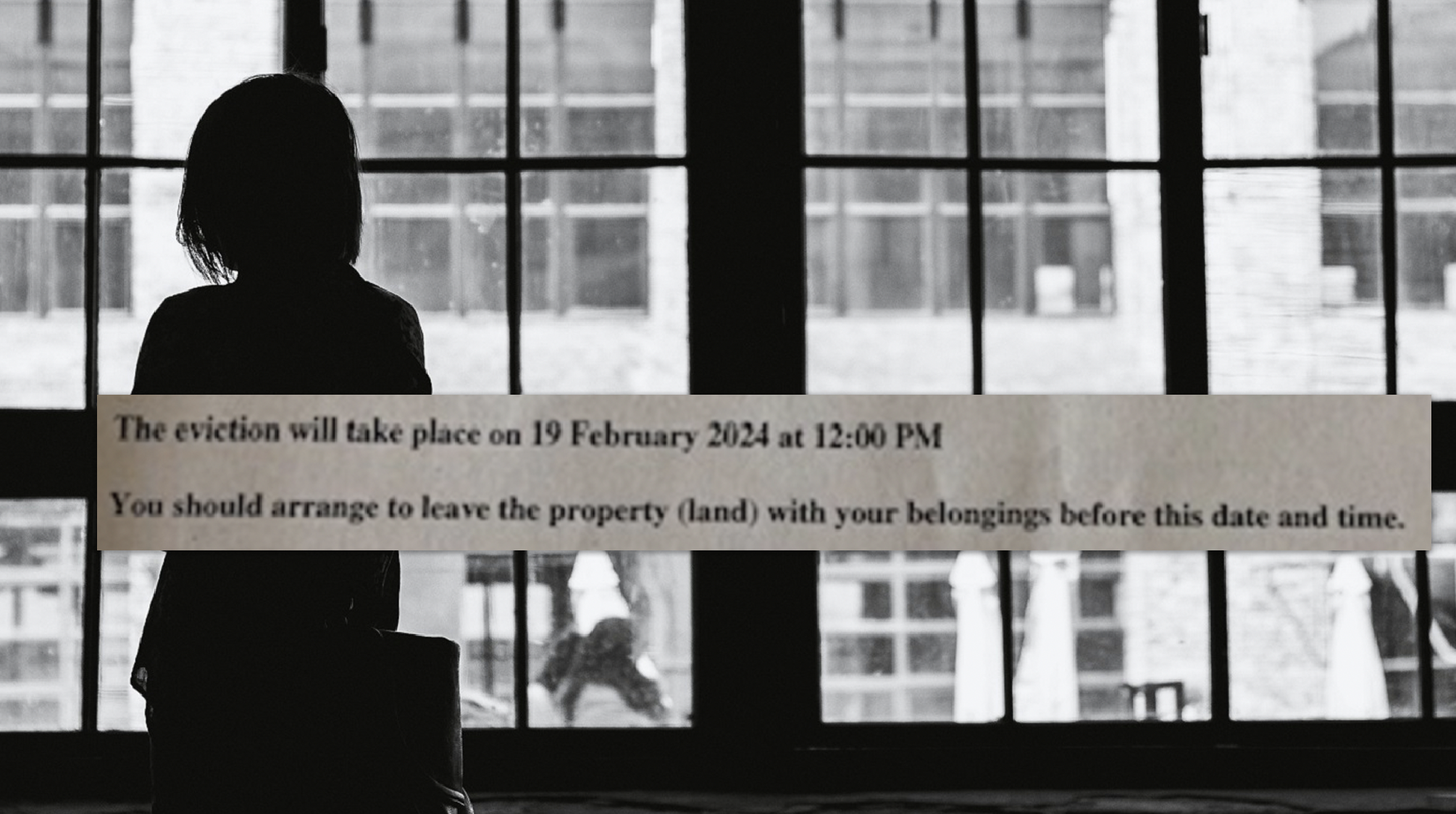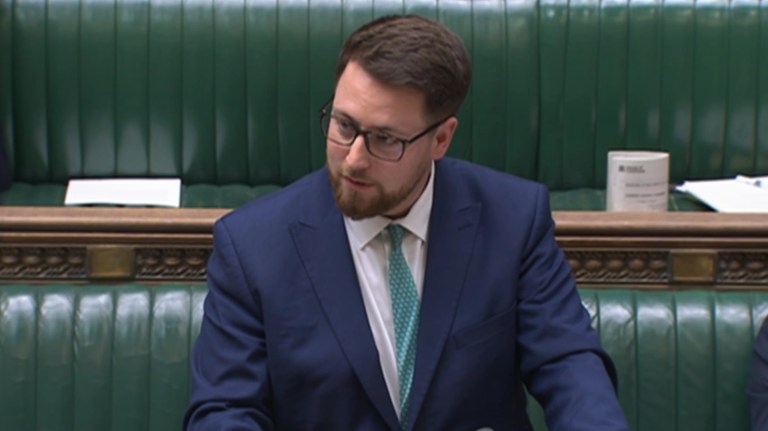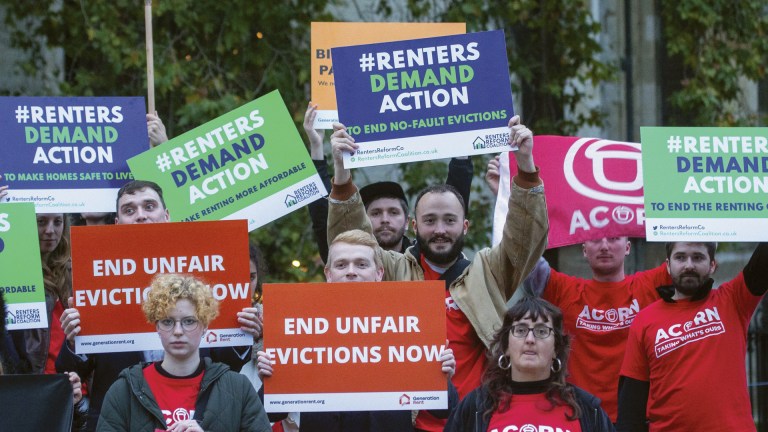‘My disabled daughter’s bedroom is her haven’
Sandra and Lucy have lived in their home for 17 years. It’s just her and Lucy, with Sandra working as her carer and claiming benefits. It’s the only home Lucy has ever known and Sandra has never missed a rent payment. Lucy’s medical conditions include bowel issues, hypermobility, microcephaly – a small skull – and auditory processing disorder. She receives the PIP disability benefit and has a disability badge.
“My daughter is autistic, she doesn’t deal well with change,” says Sandra. “Her bedroom is her sanctuary. Her bedroom is her haven. If something is moved on a shelf, she’ll know straight away.”
Sandra and Lucy first received a Section 21 eviction notice in November 2022, with their landlord saying he was selling the property in anticipation of Wales’ Renting Homes Act. Coming into force in December 2022, this new law was a huge change improving tenants’ rights, increasing the no-fault eviction notice to six months. In their case, however, it made the landlord sell up.
Sandra believes social housing is the only option – both in terms of affordability, but also for offering Lucy the stability she needs. In the Vale of Glamorgan, where Barry lies, those on the housing register are allocated ‘bands’ based on their needs. Applicants on the highest bands have greater priority for homes.
Sandra says she needs the highest band to get a house fit for Lucy’s, who needs somewhere with no steps because of hypermobility, and help to get in and out of the shower.
So far, the only properties offered are one-bed flats or sheltered accommodation. “These properties I can’t bid on because they’re not suitable for our needs,” she says.
‘We’re delaying treatment because we don’t know what’s going to happen’
Sandra was told this banding – Gold Plus – would be given once they had an eviction notice from the court. Paperwork meant delays, but they finally got an eviction notice in November 2023. Sandra played along with the process, believing it would be needed to find somewhere else to live.
As recently as 20 September, she was told by a caseworker: “Once I have the copy of the order of possession I will award you a Gold Plus banding”
However, she soon found out this had changed. “Unfortunately the scheme has changed and we no longer award Gold Plus when an order for possession has been granted. You will only be awarded this banding once you go into temporary accommodation,” her caseworker told her.
In fact, the council’s policy had changed in March 2023, six months previously, due to the extent of the housing crisis.
The Vale of Glamorgan Council says this is to ensure those in temporary accommodation are given priority and so it can move people on from temporary accommodation as quickly as possible.
In the meantime, Lucy’s health had been getting worse, fuelled by the uncertainty, Sandra says. She suffered a panic attack, has been put on anxiety medication and has lost weight. An offer of a new machine for medical treatment has been put off until they know where they’ll be living. “Because we don’t know where we’re going to be housed,” says Sandra. “We’re delaying treatment because we don’t know what’s going to happen.”
Now, Sandra and Lucy face a visit by the bailiffs on Monday. Their belongings are in storage, their pets are with friends and they don’t know what the future holds.
Disabled people are struggling to access the housing they need
A web of rules, the ongoing housing crisis, and the chronic lack of resources for local authorities mean disabled people aren’t able to access the housing they need.
Sandra got in touch with The Big Issue after we reported on the story of George Fielding, a disabled man whose London council said he must make himself homeless to receive housing support. It was only after we contacted Hammersmith and Fulham Council that they apologised, and offered Fielding further support.
The cost of temporary accommodation is already pushing councils to the limit. This week, The Big Issue revealed two English councils, Eastbourne and Medway, have asked the government for millions to prevent going bankrupt from the rising cost of homelessness. Meanwhile, private rents are rising at the highest rate in decades and a long-awaited ban on Section 21 evictions has yet to materialise.
Like the Vale of Glamorgan, councils are having to change their rules to try and cope. But in the middle are families like Sandra and Lucy.
‘Recent uncertainty over accommodation is causing her increase in stress’
Yet Sandra does not believe her case has been handled fairly, lamenting “the lack of help and support on offer when dealing with a person with disabilities”, as well as the lack of consideration given to Lucy’s circumstances. She says she has been told different things at different times, and not informed of changes to policy.
Sandra has made two complaints, both dismissed by the council, who have repeatedly said Lucy does not need accessible or adapted accommodation, based on the report of an occupational therapist.
However, letters from different doctors, seen by the Big Issue, outline Lucy’s situation.
“I do not feel it would be appropriate for her to be in a hostel or temporary accommodation and I feel the situation needs to be resolved as a matter of urgency as otherwise her physical and mental health is likely to deteriorate further,” reads one. “Recent uncertainty over accommodation is causing her increase in stress.”
Another says: “I fully support the application for housing on the highest banding based on [Lucy’s] learning disability, her limited understanding of uncertainty and mobility needs.”
Another outlines that she needs “help with showering and maintenance of personal hygiene”, along with “support and supervision throughout the day to aid with all activities of daily living”. Sandra says these have been sent to the council and “added to a file.”
The council’s own criteria for Gold Plus banding say an applicant will be awarded additional preference “depending on the severity of the circumstances” if they have a disability “which is being exacerbated by their current housing situation.”
‘I don’t think she’d cope with it’
When the bailiffs come on Monday, Sandra will be on her own, sleeping with just a blanket. Her disabled daughter Lucy will be with friends and their belongings are already in storage.
“I saved hard to buy that double fridge freezer, why should I just throw it out?”, says Sandra. “I haven’t got money to buy new again, so I’ve got to put it in storage”.
They have been told temporary accommodation is likely to be a hotel used to house homeless people and families en masse, where they expect to be sharing a kitchen with 70 families
“I know she’d have a mental breakdown and probably be hysterical crying. I don’t think she’d cope with it,” says Sandra.
And so, without suitable accommodation on offer, they won’t go there and will sleep in the car if they need to.
“I’m caught between a rock and a hard place,” she says. “If we go there, I’ve got to deal with the aftermath of sitting in the car park and her having a mental breakdown because she doesn’t want to go inside.”
A Vale of Glamorgan Council said: “We are aware of the concerns raised, which have been addressed via the council’s complaints process. If the tenant remains unhappy, they can discuss this matter further with the Public Services Ombudsman.
“There are huge pressures on accommodation in the Vale of Glamorgan and large numbers of households are approaching us for advice and assistance in respect of homelessness. There are also record number of people staying in temporary accommodation.
“It is a priority for this council to move people on from temporary accommodation as quickly as possible. We discovered that aim was being hampered by certain people under notice from private landlords and not yet homeless. They were leapfrogging households already living in temporary accommodation and so a change was made to the date the highest priority band was awarded from.
“Currently, households in need of two-bedroom accommodation are staying in temporary accommodation for between two and three months before they are rehoused.
“People’s circumstances are taken into account and we try to provide self-contained, temporary accommodation where it is needed. However, this is not always possible.
“We also appreciate that people would prefer not to move into temporary accommodation at all and that doing so can have a significant impact on their mental health and wellbeing. But, unfortunately, the acute shortage of housing and large number of people on the waiting list, means this is sometimes the only short-term option. The council works with medical and social care professionals to assess the suitability of the temporary and long-term accommodation offered and tries to meet those needs as far as limited resources allow.
“The council is striving to address housing pressures through a number of measures including building new social housing, buying back existing homes and working with private landlords to secure access to additional properties.“









